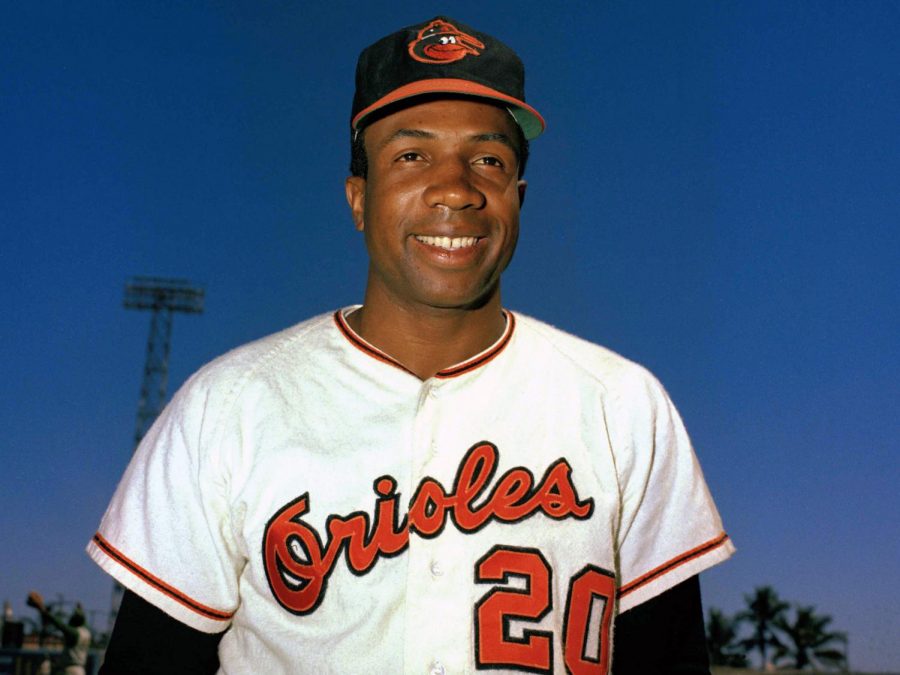Frank Robinson, baseball icon and civil rights activist
Frank Robinson won the National League MVP award during his time with the Cincinnati Reds and won the American League MVP award as a Baltimore Oriole.
February 12, 2021
Major League Baseball Hall-of-Famer Frank Robinson was known for many things. The Ohio sports legend made history as the only player to be named MVP in both the American League (AL) and National League (NL), while earning numerous other accolades over his 21-year career as a player. Robinson’s greatest impact on the sport, however, came in 1975 when he became the first Black manager in MLB history after being named player-manager of the Cleveland Indians. Since then, there have been 15 other Black managers in the MLB, with Cito Gaston becoming the first Black manager in the MLB to win a World Series with the Toronto Blue Jays in 1992.
Though he was born in Beaumont, Texas in 1935 as the youngest of ten children, Robinson spent most of his youth in Oakland, California. There, he played basketball with future NBA legend Bill Russell, who won a record 11 NBA Championships with the Boston Celtics and, similarly to Robinson, became the first Black coach in the NBA.
Robinson’s true talents were in baseball, though. In 1953, he signed a minor league contract with the Cincinnati Reds, a team he’d go on to spend nearly half of his career with. Robinson made his major-league debut three years later and won the Rookie of the Year award after tying the rookie home run record with 38 home runs.
Five years later, Robinson won NL MVP and carried the Reds to the World Series, where they unfortunately fell to the New York Yankees who were led by greats Mickey Mantle and Yogi Berra. Robinson stayed with the Reds for four more years, during which he tallied an additional 2 All-Star selections.
In 1966, Robinson was traded to the Baltimore Orioles. This trade turned out to be catastrophic for the Reds, as Robinson proceeded to have the greatest season of his career that year. He won the AL MVP award and the Triple Crown, leading the league in home runs (49), batting average (0.316) and RBIs (122). Putting the cherry on the top, Robinson went on to win World Series MVP that year as the Orioles swept the Los Angeles Dodgers en route to their first World Series Championship.
During his time on the Orioles, Robinson witnessed the level of segregated housing and housing discrimination increase throughout Baltimore. These experiences prompted him to join the NAACP, where he gave several speeches to educate others about and raise awareness of these racial issues. His actions made him another sports figurehead in the civil rights movement, once again putting him in the same company as Bill Russell.
Robinson spent five more years in Baltimore and won the World Series for a second time in 1970, taking down none other than the Cincinnati Reds. Though he appeared in the World Series with the Orioles in 1969 and 1971 as well, these campaigns ended in losses to the New York Mets and the Pittsburgh Pirates, respectively.
Following his stint in Baltimore, Robinson spent a few years in southern California, playing for both the Los Angeles Dodgers and the California Angels.
In 1974, Robinson returned to Ohio after being traded to the Cleveland Indians. Just three weeks into his tenure with the Indians, Robinson made history when the Indians named him player-manager.
Though Robinson’s playing career ended in 1976, he managed the Indians for one more year before joining the San Francisco Giants as a manager in 1981. The following year, he was inducted into the Hall of Fame for his prowess at the plate, a talent that earned him 14 All-Star selections throughout his career. At the time of his retirement as a player, Robinson had the 4th most home runs in MLB history with 586.
Robinson continued his managerial career with Baltimore, winning manager of the year in 1989 with the Orioles. Following a brief stint with the Montreal Expos—which became the Washington Nationals in 2004—Robinson retired as a manager at age 70 in 2006.
Though Robinson passed away just over two years ago, his legacy on and off the field has immortalized him in the eyes of baseball fans and civil rights activists. His lasting impact in the baseball world was recognized by the Reds, Orioles and Indians, all of whom have retired Robinson’s jersey number and dedicated bronze statues of him at their stadiums. Perhaps his greatest honors, though, were receiving the Presidential Medal of Freedom in 2005 and the Jackie Robinson Society Community Recognition Award in 2007.



